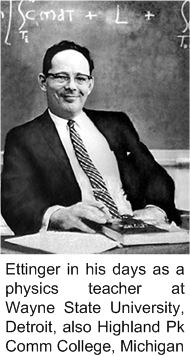The [First] Legacy of Robert Ettinger
Cryonics founder begins his cold deep nap
by Brian Wright, w/comments by Pat Heller
 Though we are not precisely contemporaries, Robert Ettinger—author of The Prospect of Immortality and Man into Superman, founder of the cryonics movement and the Cryonics Institute (CI)—and I inhabited the same milieu of SE Michigan in the days when liberty and life extension became primetime, iconic ideas in society (roughly the late 1960s and into the early 1980s).[1] Mr. Ettinger 'deanimated' a week ago at his home in Clinton Township, Michigan, where he was perfused and 'frozen'[2]
in a chamber of liquid nitrogen at the CI facility, also in Clinton Township. The Washington Post, and several other periodicals, mostly respectful, carried the story of his passing... passing from a state with heartbeat and respiration into essential biostasis. Though we are not precisely contemporaries, Robert Ettinger—author of The Prospect of Immortality and Man into Superman, founder of the cryonics movement and the Cryonics Institute (CI)—and I inhabited the same milieu of SE Michigan in the days when liberty and life extension became primetime, iconic ideas in society (roughly the late 1960s and into the early 1980s).[1] Mr. Ettinger 'deanimated' a week ago at his home in Clinton Township, Michigan, where he was perfused and 'frozen'[2]
in a chamber of liquid nitrogen at the CI facility, also in Clinton Township. The Washington Post, and several other periodicals, mostly respectful, carried the story of his passing... passing from a state with heartbeat and respiration into essential biostasis.
So the leader of a great techno-philosophical movement takes his hoped-for temporary leave by practicing what he preaches: taking a prepared respite from life, until the time medical knowledge catches up to reanimate and rejuvenate him. That is the plan. The Wikipedia article on Robert Ettinger is accurate and, again, respectful, no doubt written by those with a personal knowledge of the man and the vastness of the 'idea-prise' he created.[3] Here are some comments from Pat Heller, one of the early adopters of cryonics, and a perennial officer of CI:
Bob Ettinger is one of the most focused people I have ever met. The number one
focus of his life, other than family, was life extension through
cryonics. In the late 1940s he could see how improving medical
technology could someday advance to the point where it could revive and
rejuvenate people who under current medical standards would be
considered dead. No, he could not foresee the particular details, but
he was comfortable with the idea of scientific innovation and advances.
In the process, he anticipated the field of nanotechnology by decades!
Revitalization after cryonic freezing would be unlikely to restore a
person with 100% of their memories intact. This led Ettinger to explore
in depth the nature of the concept of identity. He hypothesized a
series of growing differences that a revived person might have and asked
where the line could be drawn from saying that the rejuvenated person
was the same personality or was not the same person.
Robert Ettinger also did a lot of thinking about how society might
change if people were able to live indefinite lifespans. For instance,
in today's world, you encounter many people only once. Whether you are
polite or rude to them is not likely to come back to haunt you. If,
instead, you looked to live for centuries, then you would likely meet
many of these people multiple times. Therefore it would tend to be in a
person's best interest to treat other people politely, honestly, and
fairly, because poor behavior could have negative consequences when you
again meet the same people down the road. As a result, Ettinger was
convinced that a longer lifespan would encourage people being decent to
one another.
Similarly, the consequences of committing a crime could be more of a
deterrent. Being sentenced to life without parole would be more
meaningful to a 50-year old person who might expect to live 500-1,000
years. Other crooks could face the prospect of living long enough to be
able to make restitution to their victims.
An extended life span would also make space travel more feasible in the
decades and centuries it might take to reach outer space destinations.
As a result of this kind of thinking, Robert Ettinger held an optimistic
view of the future and of humanity.
Ettinger did not think of cryonics as a privilege for the elite. The
Cryonics Institute, of which he was one of six co-founders, was
committed to the idea of making cryonics widely available at an
affordable cost. The organization has not raised is base $28,000 fee
since it was founded in 1976. In effect, that represents a significant
decline in price as the value of the US dollar has fallen significantly
since 1976. While some costs have increased, especially personnel,
other costs have fallen more than 80% such as liquid nitrogen.
Today, the Cryonics Institute can proudly say that all five of the
co-founders who have died (one remains alive) are frozen in liquid
nitrogen at the Cryonics Institute. For an idea that has been slow to
take hold in the public's eye, there are now more than 200 humans in
cryonic suspension around the world, with thousands of members of
various cryonics organizations.
Although Ettinger was personally an atheist, the Cryonics Institute
welcomed people of all religious beliefs or non-beliefs. Two patients
of Cryonics Institute received the Catholic sacrament of last rites, one
patient was treated by standards of Judaism, and even one was carefully
placed according to Muslim requirements...
Cryonics is not a "sure thing." Whether it ever succeeds will depend on
the actions of people alive today and in the future. I know of some
people who consider revitalization and rejuvenation of cryonics patients
as almost a given development in future technology, but I am one of
those who conservatively say that the probability of success is greater
than 0%. I have known Robert Ettinger for more than three decades. I
hope to enjoy the pleasure of his company, someday, for centuries to
come.
Patrick A. Heller
General Manager
Liberty Coin Service
300 Frandor Ave.
Lansing, MI 48912
http://www.libertycoinservice.com
I have nothing substantial to add about Robert Ettinger. Lately, I've become aligned with more of a Buddhist perspective on life, seeing the physical forms in which life resides as inherently impermanent. Consistent with that view I've founded the spiritual philosophy of Beism. But the prosecution of Beism and its corollary 'church' of Being makes me realize how kindred a soul Mr. Ettinger is to my own: the lone Don Quixote tilting at windmills, following the beat of a different drummer. Oddly, I expect Ettinger's death to reinvigorate the cryonics movement; I'm hoping I don't have to pass on before seeing the success of my own faith.
[1]
A natural alliance exists between liberty-focused individuals and those who seek the ultimate freedom, from death. Mr. Ettinger spoke as I recall at a Metro Detroit Libertarians (lively group organized by my wife Rose) meeting in the late 70s/early 80s. He would have been 60-something, and you could tell Don Quixote was tired, even a bit cynical, tilting at the cryonics windmill. Further it seemed he did not embrace the nascent libertarian
movement as symbiotic, rather as missing the point of 'without life there can be no liberty.'
[2]
Technically, cryonics patients are not frozen, rather their circulatory systems are perfused with a special liquid intended to prevent as much cellular damage as possible, while they are slowly cooled ultimately being stored in a capsule to a temperature of -371 Fahrenheit. The prep process is highly advanced at institutions such as CI.
They know what they're doing.
[3]
I, Brian Wright, am also a member of the Cryonics Institute, with a contract for cryopreservation upon conventional death.
2011 August 01
Copyright © Brian Wright | The Coffee Coaster™
Cryonics | Robert Ettinger | Cryonics Institute | CI | Pat Heller | Death |



